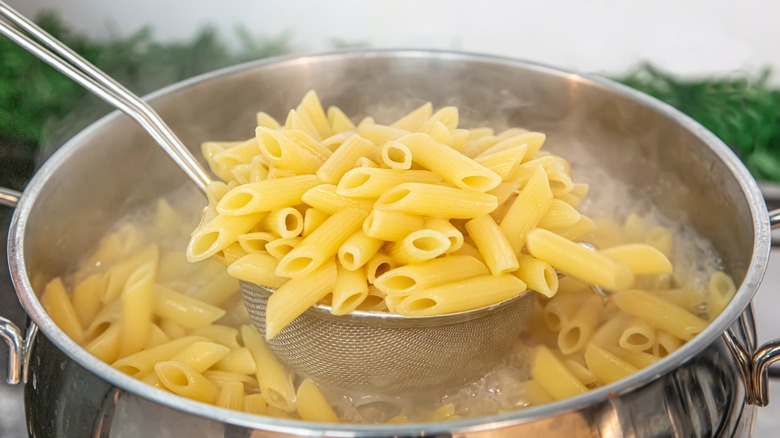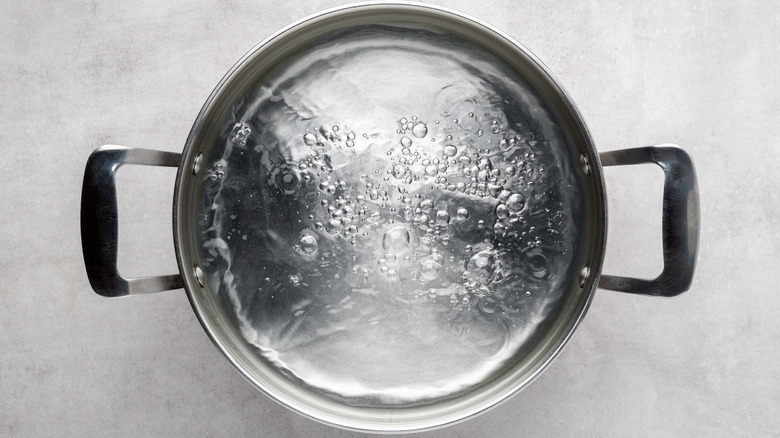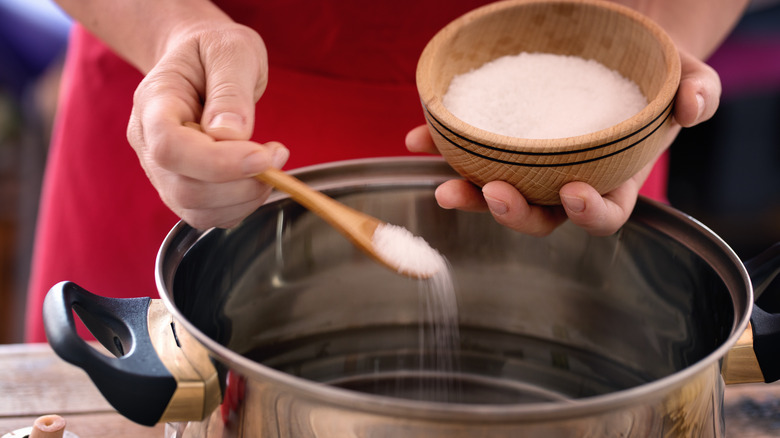You're Making A Crucial Mistake By Rinsing Your Pasta
For many home cooks, rinsing excess pasta water and starch off of pasta is just another step in the cooking process. However, you might want to hold off on that rinse if you really want to level up your next plate of pasta. In fact, unrinsed pasta could be the key to a better dish. This is because cooked, and unrinsed, pasta is coated in excess starch. This starch helps sauces adhere to noodles, coating them in perfect, saucy goodness. By rinsing your pasta, you're actually making it more difficult to get a nice coating of sauce on your dish, certainly a frustrating dining experience. After all, how disappointing is it to see a lovingly simmered sauce slip right off your perfectly al dente pasta?
However, there are some exceptions to this rule. For example, if you're serving your pasta cold, rinsing the starch off is key so that the noodles don't become gummy or clump together. Other types of pasta, such as soba noodles, should always be rinsed, even if they are served hot, so that they don't become slimy, Sonoko Sakai, a Japanese-American cooking expert told Bon Appétit. However, if you're making fettuccine alfredo or a bolognese sauce paired with tagliatelle, of course, you'll definitely want to keep your pasta unrinsed.
And that's just the start of pasta water's pasta-bilities — see what we did there? After all, a good noodle starts in the pot.
How to save and use your liquid gold pasta water
But sometimes it's not enough to just skip a rinse. In fact, adding pasta water to your sauce might just prove to be the key to perfecting your recipe. In addition to helping sauce cling to pasta, pasta water can thicken your sauce to a better consistency and help ingredients to emulsify so your sauce doesn't get clumpy. For many cooks, pasta water is considered liquid gold, a resource rather than a byproduct, which can elevate pasta and enhance other dishes.
In fact, for some sauces, such as authentic alfredo pasta, pasta water is an essential ingredient. Along with butter, pasta water helps to allow parmesan to coat your pasta. Additionally, you can save your pasta water to help with other cooking and baking projects. Using pasta water in place of regular water in bread recipes, for example, can help your bread to rise. Pasta water can similarly be used for pizza crusts. It also makes for a great base for a flavorful soup due to its salty, starchy content. Plus, it lasts several days in the fridge and even longer in the freezer.
Making sure to save your liquid gold for future cooking endeavors can make you an unbeatable force in the kitchen. But to truly master your craft, you first have to master preparing the perfect pot of pasta water.
Boiling the perfect serving of pasta
Perfect pasta water is more than just, well, pasta water. Making sure your water is properly prepared for cooking can make all of the difference in your next plate of pesto or spaghetti and meatballs.
To start, you're going to want to salt your water. Salting your water will help add flavor to your pasta. The general guidance is to add 1 teaspoon of water per 4 quarts of water and 1 pound of pasta you'll be cooking. You won't want to use regular table salt, which contains iodine, as it can produce potentially harmful byproducts when added to boiling water. Instead, you'll want to add iodine-free salts such as Kosher or sea salt to your pasta water. This will make sure your pasta isn't bland and can help to take your dish to the next level.
Another trick to perfect pasta water: no oil. You may feel tempted to tip a small pour of olive oil into your pasta water, as a way of keeping your water from boiling over. However, this isn't the case, and adding oil can actually make your pasta slick, and prevent it from sticking to your sauce, making for one (or many) slippery noodles.
Additionally, you should always make sure to put your pasta into your water when it is at a boil. Putting pasta in prior to the water boiling will prevent your pasta from cooking at the correct pace, and may result in under or overcooked pasta.
As it turns out, making pasta comes down to more than just plopping your pasta into a pot of water, and preparing pasta water correctly can make for an even better final product.


